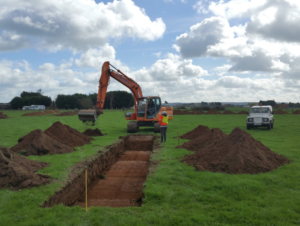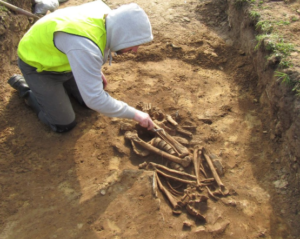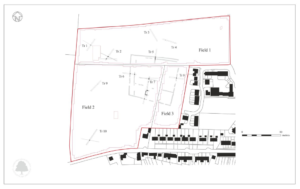Have you been asked to fund an archaeological evaluation as part of your planning application? Read on to understand what this phase of work involves and what it is for.
What is an Archaeological Evaluation?
An archaeological evaluation is an initial phase of fieldwork within a specified area that provides information on the nature, extent, quality and significance of archaeological remains present on a site.
Why is an archaeological evaluation required?
Archaeological evaluations are required either in support of planning applications or to fulfil planning conditions. They are requested by Local Planning Authorities (LPA) to help them make an informed decision about the scope of any further archaeological work that might be required in response to a development. Each LPA will have access to a database of known archaeological sites – if your site is within an area of interest, an evaluation can help to ascertain the nature and extent of any surviving below ground archaeology.
What does an archaeological evaluation involve?
Depending on the type and scope of the development work (e.g depth of groundworks, extent and size of development) and what the planning archaeologist expects to find, the evaluation techniques will vary. An evaluation will typically involve the excavation of trial trenches or test pits sited strategically across the site, but fieldwalking, geophysical survey, boreholes and deposit modelling may also be required. The evaluation strategy should ensure that enough information is recovered to fulfil the planning conditions.
Sometimes it may be possible to combine the archaeological site investigations with the work of appointed geotechnical engineers – so it’s worth raising this with your archaeological consultant since it could save time and money.
How long does an evaluation take?
The length of time an evaluation takes depends on the complexity of the site. A small rural setting with a couple of test pits could involve a single site visit. A more complex urban site or a large development proposal may take a couple of weeks, or more. Make sure you work with an archaeological consultancy who know and understand the local area, since they will have experience of working with the local planning authorities and understand the local heritage and geology.
What next?
After the evaluation your archaeological contractor will produce a report sharing the results of the evaluation and the nature of the archaeology on the site.
The report will help the planning department to decide whether subsequent mitigation work is needed or whether the risk to archaeology is minimal enough to warrant planning consent without any further archaeological conditions.
If you need help or advice regarding an archaeological evaluation get in touch. We offer a range of specialist archaeological services and our experienced team work on archeological evaluations in Exeter, Devon and across the South West.




Recent Comments